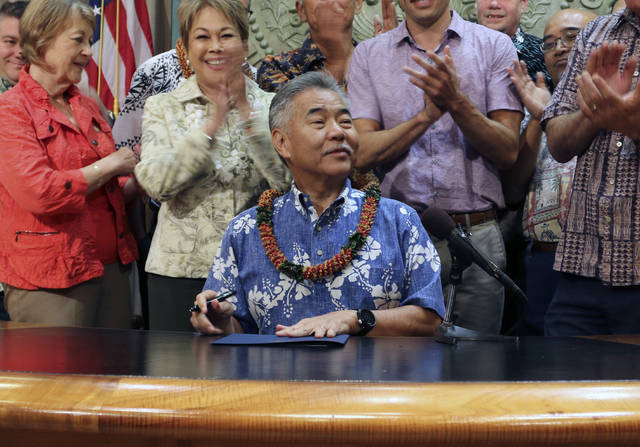HONOLULU — Hawaii Gov. David Ige wants voters to look at his four years of accomplishments, including his handling of the Big Island’s erupting volcano, as reasons to give him a second term.
But U.S. Rep. Colleen Hanabusa, his main opponent in Saturday’s Democratic primary in the heavily blue state, wants voters to look at 38 minutes in January as reason enough to send Ige packing.
That’s how long panicking Hawaii residents waited to learn that a warning about an incoming ballistic missile was not real. Officials mistakenly sent a statewide alert to cellphones, televisions and radios warning of an imminent attack on Jan. 13. “THIS IS NOT A DRILL,” the message read.
It was a drill — one never intended to be seen by the public — and the hysteria it caused sparked a firestorm of criticism against Ige.
“When you hear the stories about what people did in 38 minutes, it gives you a clear sense that it truly affected so many people,” said Hanabusa, who is giving up her seat in Congress to challenge the governor.
Ige has his own criticisms, saying she caters to special interests and has a questionable history with ethics.
Robin Berenstain, 68, a clinical social worker at a military base on Oahu, remembers believing the missile alert that screeched on her phone. She said she called her family to tell them she loved them.
“I live in Kaneohe and overlook the bay, and opened my sliding glass door as wide as I could to be sure I’d go out on the first blast,” Berenstain said. “I had no desire to live in a post-apocalyptic world.”
She said it was “shocking” that it took so long to set the record straight.
“I work with families on the Marine base, and many of them were terrified for 38 minutes, and that’s just unacceptable,” Berenstain said. “I’m pretty sure I’m voting for Hanabusa.”
While Ige acknowledged that he was “ultimately responsible” for the mishap, he repeatedly pointed to “human error” and a low-level state employee who sent the alert as the cause for the panic. But Ige ordered his defense department to roll out the nuclear attack plan before it was ready, providing the framework for the error.
The Ige administration has denied an Associated Press request for emails, phone records and calendars related to the missile alert, something Hanabusa also criticized.
“He should give us his phone records so that we know who he talked to in that 38 minutes,” Hanabusa said.
Ige said the state has implemented technical safeguards that would prevent another mistake.
“I told the people that we would do an assessment and implement the appropriate changes,” he said. “We are still the only state in the country that really are making plans for a nuclear attack.”
Ige criticizes Hanabusa’s time in the state Legislature and on Capitol Hill.
“Too many decisions were being made on behalf of special interests and self-interest,” he said.
The governor said that when Hanabusa was president of the state Senate and he was a senator, she fought for a $75 million tax credit to develop an Oahu resort area.
A developer who has ties to Hanabusa and her husband was the primary recipient of the tax break.
The developer, Jeff Stone, then bought several luxury town houses at the resort and sold one to Hanabusa’s now-husband. The two were engaged at the time, and Hanabusa lived in the town house.
Ige said the house was then flipped for a $400,000 profit “in a relatively short time period.”
Stone did not return a call seeking comment.
Hanabusa claims Ige is making a political issue out the situation and his campaign knows she paid rent to live in the house and wasn’t directly involved in the purchase.
“The developer received $3 million in tax credits for essentially running their business,” Ige said, adding that Hanabusa was “not only supporting a special interest but really advocating on behalf of a special interest.”
Dennis B. Miller, a voter who owns two small businesses in Waikiki and is an organizer for a universal health care advocacy group in Hawaii, thinks the tax break deal is just another example of corruption in state government.
“I think that what she did there was a normal part of the status quo of accepted corruption in Hawaii — that’s part of why we have one party,” Miller said of the deeply Democratic state. “That’s normal among our establishment, and I do think it’s wrong.”
He plans to vote for Ige, saying the governor is the “lesser of two evils.”
Whoever wins Saturday will face the winner of the Republican primary in November’s general election.
For the GOP, John Carroll, a former state lawmaker who lost in a landslide to Democrat Brian Schatz in the 2016 U.S. Senate race, is running against state Rep. Andria Tupola, the House minority leader and one of only five Republicans in the 51-member chamber.
Political newcomer and former Pearl Harbor nonprofit CEO Ray L’Heureux is also running.
Carroll said Hawaii “is in economic chaos” and plans to sue to lift shipping restrictions that prevent products from Asia and elsewhere from being delivered directly to the islands.
Federal law requires goods bypass the state, go to the mainland then get shipped back to Hawaii by companies that Carroll describes as having a “monopoly” on the import and export business.
“We’re cut off from every pipeline, highway, railroad by the Jones Act restrictions,” he said.
Tupola said one of her focuses as governor would be addressing affordable housing. Native Hawaiians in particular need the opportunity to use land set aside for them decades ago, she said.
“That is one of the most disappointing things that Hawaiians have had for a long time because we have not been producing houses,” she said.




